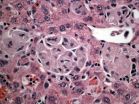Insulin sensitivity may explain link between obesity, memory problems
2010-10-20
(Press-News.org) AUSTIN, Texas — Because of impairments in their insulin sensitivity, obese individuals demonstrate different brain responses than their normal-weight peers while completing a challenging cognitive task, according to new research by psychologists at The University of Texas at Austin.
The results provide further evidence that a healthy lifestyle at midlife could lead to a higher quality of life later on, especially as new drugs and treatments allow people to live longer.
"The good thing about insulin sensitivity is that it's very modifiable through diet and exercise," says psychology graduate student Mitzi Gonzales, who co-authored the paper published in the journal Obesity with Assistant Professor Andreana Haley and other colleagues.
To better understand why midlife obesity is linked to higher risk of cognitive decline and dementia in old age, the researchers had middle-aged adults between 40 and 60 years of age complete a challenging cognitive task while undergoing functional magnetic resonance imaging (fMRI).
While obese, overweight and normal-weight participants performed equally well on the task, obese individuals displayed lower functional brain response in one brain region, the inferior parietal lobe.
Obese participants also had lower insulin sensitivity than their normal weight and overweight peers, meaning that their bodies break down glucose less efficiently. Poor insulin sensitivity may ultimately lead to diabetes mellitus if the pancreas is unable to secrete enough insulin to compensate for reduced glucose use.
The study shows that impaired insulin sensitivity, which generally accompanies obesity, may serve as a mediator between midlife obesity and cognitive decline later on. Researchers chose to examine insulin sensitivity because insulin helps regulate people's metabolism and also affects cognitive functions.
The study exemplifies the aim of Haley's lab, which is to use neuroimaging in middle-aged individuals to provide early identification of risk for cognitive decline later in life.
"Generally, very few people study the middle-aged segment of the population, but that's when many chronic diseases are first identified and neurodegenerative processes are triggered," says Haley. "We found that while behavioral performance of obese middle-aged individuals may be the same — they can complete the same cognitive tasks as normal weight individuals — their brain is already doing something different to produce that outcome."
Haley and Gonzales are planning a follow up study to determine if a 12-week exercise intervention can reverse the observed differences in brain response.
###
For more information, contact: Gary Susswein, College of Liberal Arts, 512 471 4945; Andreana Haley, Clinical Neuroscience Lab, 512-232-0863; Mitzi Gonzales, Clinical Neuroscience Lab, 512-232-0863.
END
ELSE PRESS RELEASES FROM THIS DATE:
2010-10-20
URBANA – University of Illinois scientists think they have solved an interesting problem: how to get protein-deficient Indian schoolchildren to consume soy, an inexpensive and complete vegetable protein. What's more, they've joined forces with an Indian foundation that can get the high-protein soy snack they've developed into the hands of 1.2 million hungry kids who need it.
"Although the country has decidedly vegetarian tastes, the Indian people just don't care for soy," said Soo-Yeun Lee, a U of I associate professor of food science and human nutrition.
India is ...
2010-10-20
Washington, D.C. (October 19, 2010) -- In the world of the very small, researchers at Shanxi University in China have announced progress in understanding the single-molecule magnet, which combines the classical macroscale properties of a magnet with the quantum properties of a nanoscale entity. In the Journal of Applied Physics, Hai-Bin Xue and colleagues studied the statistics of how electrons move through a single-molecule magnet to better understand the magnet's inner level structure.
Understanding the single-molecule magnet inner level structure is an important step ...
2010-10-20
In a world first, a completely robotic surgery and anesthesia has been performed at the McGill University Health Centre (MUHC). The DaVinci surgical robot, which lets surgeons work from remote locations, was put to work this summer, whereas the anesthesia robot, nicknamed McSleepy, has been providing automated anesthesia since 2008. The two combined to perform the first all-robotic surgery on a prostatectomy patient at the Montreal General Hospital.
"Collaboration between DaVinci, a surgical robot, and anesthetic robot McSleepy, seemed an obvious fit; robots in medicine ...
2010-10-20
Princeton engineers have developed a sensor that may revolutionize how drugs and medical devices are tested for contamination, and in the process also help ensure the survival of two species of threatened animals.
To be fair, some of the credit goes to an African frog.
In the wild, the African clawed frog produces antibacterial peptides -- small chains of amino acids -- on its skin to protect it from infection. Princeton researchers have found a way to attach these peptides, which can be synthesized in the laboratory, to a small electronic chip that emits an electrical ...
2010-10-20
Outgoing. Assertive. Calm. Practical. Decisive. These are obvious qualities that one would want in their leaders.
But what about, say, arrogant, hesitant, overly dramatic, inflexible, or being a "yes-man"? A new study has found that when it comes to leading, some of those negative personality traits aren't such a bad thing, either.
The work, by researchers in the University of Nebraska-Lincoln's College of Business Administration, studied the development of leaders over a three-year period. Prior research had established that clearly positive personality qualities ...
2010-10-20
WASHINGTON, D.C., October 19, 2010—In response to a study regarding fish oil use during pregnancy published in the October 19 issue of the Journal of the American Medical Association (JAMA), the Council for Responsible Nutrition (CRN), the leading trade association for the dietary supplement industry, reminds pregnant and lactating women of the undisputed importance of consuming the recommended amounts of docosahexaenoic acid (DHA) throughout pregnancy. This can be done by eating two servings of fatty fish, such as sardines or anchovies, per week, or taking fish oil supplements ...
2010-10-20
The 2010 Nobel Prize in Physics went to the two scientists who first isolated graphene, one-atom-thick crystals of graphite. Now, a researcher with the University of Houston Cullen College of Engineering is trying to develop a method to mass-produce this revolutionary material.
Graphene has several properties that make it different from literally everything else on Earth: it is the first two-dimensional material ever developed; the world's thinnest and strongest material; the best conductor of heat ever found; a far better conductor of electricity than copper; it is virtually ...
2010-10-20
Athens, Ga. – When we make decisions based on what we think someone else will do, in anything from chess to warfare, we must use reason to infer the other's next move—or next three or more moves—to know what we must do. This so-called recursive reasoning ability in humans has been thought to be somewhat limited.
But now, in just-published research led by a psychologist at the University of Georgia, it appears that people can engage in much higher levels of recursive reasoning than was previously thought.
"In fact, they do it fairly easily and automatically," said Adam ...
2010-10-20
ANN ARBOR, Mich. – Millions worldwide die each year because they can't afford a pacemaker. Meanwhile heart patients in the United States say they'd be willing to donate theirs after death to someone in need.
In the current issue of Circulation, experts at the University of Michigan Cardiovascular Center examine the legality and logistics of collecting pacemakers, after they are removed for burial or cremation, for sterilization and reuse across the globe.
Small humanitarian efforts have shown reusing pacemakers is safe and effective with little risk of infection and ...
2010-10-20
Researchers at Yale School of Medicine have found that new disease pathways involving more than one cell type leads to Type 1 Gaucher disease, a rare genetic disorder in which fatty substances called glycosphingolipids accumulate in cells, resulting in liver/spleen enlargement, osteoporosis, bone pain, and increased risk of cancer and Parkinson's disease.
The new findings could lead to less expensive and more effective ways to treat the disorder, which affects about 1 in 50,000 people in the general population. Those of Eastern and Central European (Ashkenazi) Jewish ...
LAST 30 PRESS RELEASES:
[Press-News.org] Insulin sensitivity may explain link between obesity, memory problems


